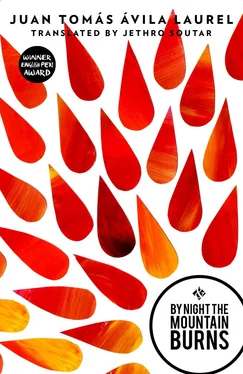Juan Ávila Laurel - By Night the Mountain Burns
Здесь есть возможность читать онлайн «Juan Ávila Laurel - By Night the Mountain Burns» весь текст электронной книги совершенно бесплатно (целиком полную версию без сокращений). В некоторых случаях можно слушать аудио, скачать через торрент в формате fb2 и присутствует краткое содержание. Год выпуска: 2014, Издательство: And Other Stories Publishing, Жанр: Современная проза, на английском языке. Описание произведения, (предисловие) а так же отзывы посетителей доступны на портале библиотеки ЛибКат.
- Название:By Night the Mountain Burns
- Автор:
- Издательство:And Other Stories Publishing
- Жанр:
- Год:2014
- ISBN:нет данных
- Рейтинг книги:5 / 5. Голосов: 1
-
Избранное:Добавить в избранное
- Отзывы:
-
Ваша оценка:
- 100
- 1
- 2
- 3
- 4
- 5
By Night the Mountain Burns: краткое содержание, описание и аннотация
Предлагаем к чтению аннотацию, описание, краткое содержание или предисловие (зависит от того, что написал сам автор книги «By Night the Mountain Burns»). Если вы не нашли необходимую информацию о книге — напишите в комментариях, мы постараемся отыскать её.
By Night the Mountain Burns — читать онлайн бесплатно полную книгу (весь текст) целиком
Ниже представлен текст книги, разбитый по страницам. Система сохранения места последней прочитанной страницы, позволяет с удобством читать онлайн бесплатно книгу «By Night the Mountain Burns», без необходимости каждый раз заново искать на чём Вы остановились. Поставьте закладку, и сможете в любой момент перейти на страницу, на которой закончили чтение.
Интервал:
Закладка:
The ministrants sang things in a language that was not our own, and they therefore said things we didn’t understand. And given who that man was, the ministrants must have sung for hours and hours when he died and, I should imagine, they also took measures to elect the next senior ministrant. His funeral was a sight to behold, or not to. After the Padre ’s Latin, the laments drowned out the murmur of the waves breaking on the shore. And if it had been day, night would have fallen, for on an island where we had nothing to combat the eternal darkness, we felt particularly vulnerable at night. Then again, on moonlight nights we felt exposed, for the moon lit up the whole village and advertised our helplessness. I always felt that moonlight nights revealed our skeletons, our defects. In fact the moon illuminated more than the sun did, for night was not meant for seeing as much as we saw on moonlight nights on the island. You could see from one extreme of the beach to the other, and if you saw someone standing at the other end you felt unnerved, for perhaps that someone had evil intentions. I’m not saying I preferred the dark exactly, but moonlight nights were frightening. They exposed our privacy to the world. Night is a time for privacy, for doing little things alone, and moonlight nights upset all that and cause misunderstandings. I remember the story of some older boys who were part of my family, although they lived in a different house rather than with us. Once, they got up in the early hours to gather mangoes, but on a moonlight night. Several cocks had crowed and they thought this singing clock meant it was dawn, or that dawn was at least around the corner. So they got up and they called for one another and they set off walking. Mangoes grow in great abundance on the island but you always go to get them in the early hours, so as not to have to climb any trees. If you get there before anyone else, you can fill your basket gathering mangoes from the ground, mangoes that have fallen from their branches because they are ripe. So those boys went and filled their baskets, but they waited for day to break before heading back home. Everything has its ways and its rules on our island. If they’d set off home right away, when the sun was poking over the blue horizon, they would have crossed paths with the women on their way to the plantations, and this might have led to a scene whereby they had to bend down to let a lady pluck a handful of mangoes from their baskets. The lady might be an aunt, a godmother, a neighbour or the mother of a friend, and it was rude not to offer her mangoes from your basket. She would need a mango to help her digest the hunk of cassava bread she’d taken with her to eat while she was working. And she might not have time to go looking for her own mangoes, if indeed she had a mango tree on her plantation.
So those boys filled their baskets and waited for day to break, to avoid such an eventuality. But what happened? They’d let themselves be tricked by the brightness of the moon, believing it to be dawn when it wasn’t, and so they’d got up and set off in the middle of the night. When they realised their mistake, they huddled together, laid their lengths of cloth on the ground and tried to sleep, waiting for the sun to appear and re-establish normality. And it was cold, as it always was at night. And when the moon withdrew behind the clouds, they became afraid, for darkness took hold of the bush and this was something they’d not experienced before. Being in the bush at night. They had never been in the bush at night, it was not something anyone chose to do, and indeed there was no reason for doing it. If, on the other hand, they’d gone straight home, ignoring their fear, it would have meant they’d left and gone back to the house in the middle of the night, and this would have been very suspicious behaviour. And their return would have been noted. And collecting mangoes wouldn’t have been a good enough explanation for coming and going at night, especially not given the rules of courtesy involved in gathering mangoes. Why should women waste precious time and energy searching their plantations for mangoes when they could be given a handful by children? What would the men have taken with them to wet their throats whilst out fishing if they hadn’t crossed paths with the boys and their baskets of mangoes on the way to the beach?
But anyway, it wasn’t mango season when the senior ministrant died, or, if it was, they weren’t ripe yet, for neither the man nor the boy accompanying him saw anyone carrying a basket of mangoes on their head. What they would have seen were women going to the plantations to harvest daily food staples. And given all that followed, we also know that they saw someone going to the plantations with evil intentions, or rather someone whose intentions were governed by an evil being. The ministrant said something along those lines before his soul was ripped out of his body. And what he said led to everything that followed, with his relatives charging down from the upper part of the big village. And what that man said was that he’d been followed that morning as he made his way to the palm tree, followed by someone with evil intentions, and it had been that someone who’d thrown him out of the palm tree with such great force that his body had hit the ground and had the life squeezed out of it. Those were the dying words his relatives kept in their hearts. Until the day they acted upon them. What they’d kept in their hearts moved their feet, made them come running from the upper part of the big village to the lower part.
It was the afternoon. They’d kept the words in their hearts for several days and they thought it was time everyone knew what those words were. Well, everyone as in everyone on the island. So what they did, acting as one, was go to the house of the woman I mentioned earlier, the one who lived at the end of a street that began at the shore, crossed our street and ran all the way to the upper part of the village. That woman had two daughters, only two, and lived with a man who was quite well known. He was a man who spoke in a very soft voice, in a woman’s voice, or practically a woman’s voice, and he also sometimes did women’s jobs, although he fished too. All the children knew him because adults had to answer us when we greeted them. And so we knew that man because of his woman’s voice, or child’s or sick person’s voice, and also for his hesitant walk. He was called Toiñ. And his voice was the voice of a man who had little to say. Why did he speak in such a soft voice? What was he afraid of? What was he hiding?
They went to the house where they knew Toiñ’s wife would be, and they called her to the door and told her what they’d kept in their hearts, or maybe they didn’t, and they started to beat her with sticks. Her two daughters tried to intervene, tried to save their mother, but they were violently pushed aside. The quarrel wasn’t with them, they needn’t be afraid. They took stock and saw there was nothing they could do, not when faced with so many furious people, furious people full of wicked intent. Later I realised the furious people had been quite calculating. Those two daughters were defenceless, for they hadn’t any male siblings. And there were not many of them, only two. There were no male children in the family, no strong men to defend them. That’s partly why the ministrant’s family members were so bold, and also because of the words they’d kept in their hearts, the words that had given them the strength to act in the first place.
The woman could not fend them off, nor could her two daughters, and the ministrant’s family saw there was nothing to stop them from doing exactly as they pleased. And they started to beat the woman out of her house. The woman didn’t know what was happening and so she ran out of the house, down the hill that separated the upper part of town from the lower part and into the cluster of streets that led to the beach. She received blows all over her body and she cried out, pleading for them not to kill her, but whatever it was her pursuers carried in their hearts, it was strong, stronger than her pleas and appeals. Don’t kill me, what have I done to deserve this, what have I ever done to hurt you? But they weren’t interested. They went on beating her with all their might and all over her body, wherever they happened to strike. She carried on running, she was knocked to the ground by the blows, and she wasn’t young, but she got up, and took further blows; she had long been bleeding, and she lost her balance again, but her enemies went on beating her on the ground; she got back on her feet and carried on running, although her strength was dwindling, and she ran right through the centre of the village and reached the vidjil where her husband was, Toiñ. She thought because he was a man and her husband he’d be able to defend her. And besides, there were always other men at the vidjil , men who went there to relax, and they would intervene, they would show the good sense expected of the sort of man who went to the vidjil , and they would call an end to the beating. So she got to the vidjil and she saw her husband and, with that voice of his, that made him speak so slowly and softly, he tried to say something, to find out what was going on and bring the whole brutal act to an end; our island had never seen anything like it. But the men with sticks attacked Toiñ and in no time at all they’d broken one of his arms and were ready to go much further. The other men in the vidjil read the danger but they didn’t say anything and they didn’t intervene, rather they expelled the woman from their building. They did not come to her defence. That’s right: she’d taken refuge in the vidjil , sought the protection of her husband and his colleagues, but the men expelled her and left her to face the evil of her pursuers alone, totally alone. First she’d been denied the help of her daughters, then her husband had been unable to defend her and now she’d been thrown out by the men of the vidjil . This latest blow made her realise she’d reached a decisive moment in her life and had to make an important decision, one that nobody could make for her. And if she didn’t make it right away, a hail of sticks would come down on her and mean there were no more decisions to make. She was half-naked when she came out of the vidjil that had turned her away, and she directed her tears and her tottering steps towards the upper part of the big village, towards the Misión . What she decided to do, nobody could do for her, and she knew she had little time left to do it. She was bleeding profusely and she could hardly see, but one thing kept her going, made her keep her grip on life. With what little energy she had, she covered the distance from the vidjil to the Misión . She fell several times, each fall an opportunity that was made the most of by her pursuers, the senior ministrant’s family, who paused to select where best to strike her, where would cause her the most harm. She bled profusely. From all parts. With tremendous effort, she reached the church and went inside. When she came out and they did what I’ve already talked about, with the sticks and her nakedness, I became overwhelmed with the terrible feeling that what I was witnessing was something quite extraordinary. I was not old enough to see such a thing, nor will anyone ever be old enough. They beat her with sticks until she died; that’s right, they beat her to death, out in the open, after chasing her through the streets of the big village, after she’d gone to the vidjil and been turned away, after she’d been into church and confessed and taken Communion. She died out in the open, after her two daughters were unable to save her, after her husband, Toiñ, whose arm had been broken, was unable to save her, after the men in the vidjil were unable to save her. I am still amazed by the fact that her pursuers waited for her outside the door of the church to finish her off. I am still amazed that the priest didn’t come out to defend her, to speak to those men, women and children who were so possessed with wicked fury. But what the people of our village, of our island, don’t seem to understand is that we all participated in her death, that there will never be another event at which every islander participates as much as we did that day, with that brutal slaying, for it took place out in the open, on the streets, at the vidjil , in the church. That woman gave up her soul out in the open, as if she’d died in a tragic accident, as if the only reason she didn’t die in bed, at home or in the hospital was because her death was a tragic accident. Oh! Now I see what the ministrant’s family perhaps wanted: they wanted her death to echo the death of their father, the senior ministrant, and come like a tragic accident out in the open. Never can an entire village have been so implicated in a single incident as with this. Because everyone took part, even those who thought they didn’t. Seeing is a form of taking part, and nobody can claim they didn’t see it. And maybe they didn’t intervene because deep down, when it really came to it, they thought those people had their reasons for doing what they did. And this is what they did — I’ll describe it for what I hope will be the very last time:
Читать дальшеИнтервал:
Закладка:
Похожие книги на «By Night the Mountain Burns»
Представляем Вашему вниманию похожие книги на «By Night the Mountain Burns» списком для выбора. Мы отобрали схожую по названию и смыслу литературу в надежде предоставить читателям больше вариантов отыскать новые, интересные, ещё непрочитанные произведения.
Обсуждение, отзывы о книге «By Night the Mountain Burns» и просто собственные мнения читателей. Оставьте ваши комментарии, напишите, что Вы думаете о произведении, его смысле или главных героях. Укажите что конкретно понравилось, а что нет, и почему Вы так считаете.












